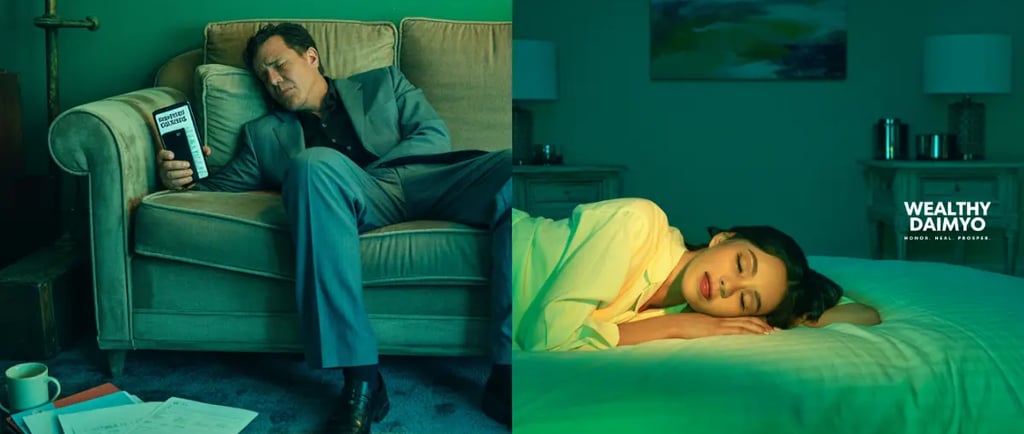When Rest Still Feels Like Laziness After Financial Survival
Why it’s so hard to slow down after years of pushing through
Wealthy Daimyo
3 min read


You finally slow down. Not because you want to — but because you can. For the first time in a long time, nothing’s on fire. The bills are paid, the workday ends on time, and you don’t wake up to financial chaos.
But instead of relief… you feel restless. Guilt creeps in. You wonder if you’re wasting time. You look around for something “productive” to do. Because after everything you’ve been through, doing nothing feels wrong. It feels like a threat.
This isn’t laziness. It’s a survival response.
When your body has lived in fight-or-flight mode for years — racing to cover rent, juggling late-night side gigs, managing debt, hustling without pause — rest doesn’t feel natural. It feels suspicious.
When Rest Feels Unsafe
You don’t relax. You monitor. You scan. You pace.
Even when things are calm, your brain’s still bracing for the next blow. That one unexpected bill. That one bad call from work. That one moment that flips everything.
Because you’ve lived it before. You know how fast things can fall apart.
So now, every time you try to breathe deeply, your mind whispers:
“Shouldn’t you be doing more?”
You start organizing drawers. You reply to emails you don’t care about. You guilt yourself out of naps.
You tell people you’re “fine,” but inside, you’re afraid that slowing down might cost you everything.
And that’s what no one teaches us: for people who’ve survived financial hardship, rest feels dangerous — not healing.
Productivity Was Your Protection
You became someone who could always be counted on. You worked longer, stayed later, pushed harder. You prided yourself on being tireless. People even admired your hustle — but they never saw the fear behind it.
It wasn’t ambition. It was protection.
Because when you’re broke or uncertain, being “useful” becomes a way to feel safe.
You overextend to prove your value. You say yes when you’re exhausted. You don’t pause, because pausing might mean falling behind.
And when that pattern is all you’ve known for years, it becomes your identity.
Which is why, even now — even when your situation has improved — you still struggle to sit still without feeling like you’re failing.
This Isn’t About Laziness — It’s About Safety
There’s a reason so many people feel uncomfortable during quiet seasons:
They were never taught how to feel safe without being in crisis.
For some, rest feels like wasting potential. For others, it feels selfish. But for many — especially those who’ve grown up in survival mode — rest feels like an emotional freefall. A loss of control. A silence that’s too loud.
It’s not because they don’t want rest. It’s because they’ve never known how to trust it.
So if this is you — if you’re in a better place now but you can’t seem to stop running — know this:
Your nervous system needs time to catch up to your reality.
You’re not lazy. You’re just unlearning habits that once kept you safe.
Healing Starts With Permission
You don’t need to “earn” a weekend off. You don’t need to have every task done to deserve stillness.
You don’t need to explain why you’re not “grinding” today.
Rest isn’t a reward for suffering. It’s a basic part of emotional and financial healing.
But giving yourself that kind of permission takes practice — especially if your inner dialogue is still wired to fear softness.
At Wealthy Daimyo, we know that rest is an emotional skill — not just a lifestyle upgrade.
We’ve seen how long it takes to stop measuring your value by exhaustion. We’ve seen the grief that shows up when people realize they’ve worked themselves numb just to survive. And we’ve seen how powerful life becomes when they finally say:
“I don’t have to prove my worth through suffering anymore.”
Building a Life That Doesn’t Rely on Burnout
The goal isn’t just rest. The goal is to build a financial and emotional foundation where rest becomes natural, not guilt-ridden.
This could mean simplifying your budget so it supports space, not just survival. It could mean creating boundaries with work that protect your evenings and your mental clarity. Or it could be something as subtle as allowing yourself to eat slowly again — without checking your phone between bites.
Whatever it looks like, this is your next chapter.
A life where rest isn’t questioned — it’s part of your recovery.
And if you’re still not there yet? That’s okay too. You’ve lived in high-alert for a long time. You don’t heal overnight. But every time you pause, breathe, and choose peace anyway — even for five minutes — you’re reminding your nervous system that you’re no longer in danger.
That’s how healing begins: with one moment of self-trust at a time.
Final Thoughts: Rest Is What Resilience Looks Like Now
You’ve already proven you can survive.
Now prove to yourself that you’re allowed to rest. Not after you crash. Not after you burn out.
Now.
Because rest isn’t weakness. It’s proof that you’ve created a life where survival is no longer your full-time job.
And that is something to be proud of.
Let’s Connect
contact@wealthydaimyo.store
Whether it’s a question, collaboration, or a moment of financial truth — we’re here.
Protected under DMCA and registered with ProtectMyWork.com.
No part of this site may be copied or reproduced without written consent.
© 2025 Wealthy Daimyo. All rights reserved.
